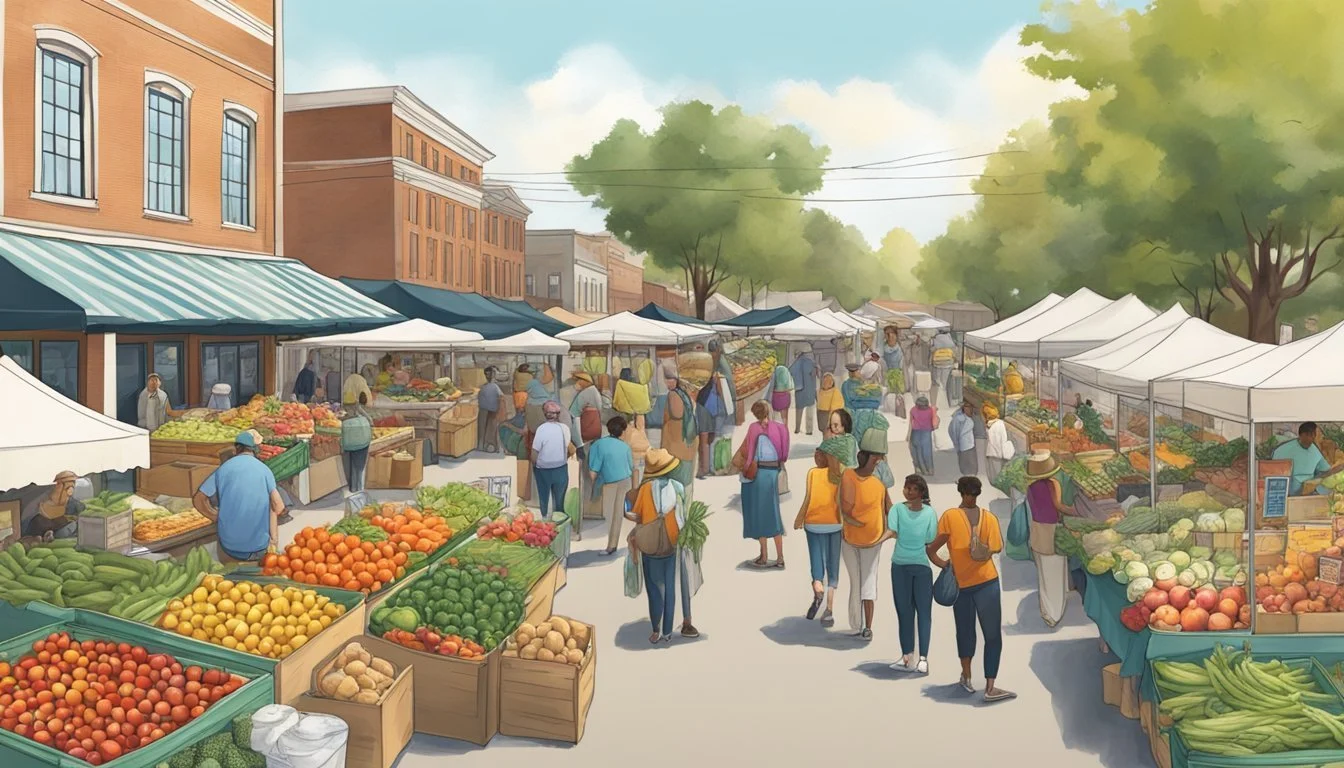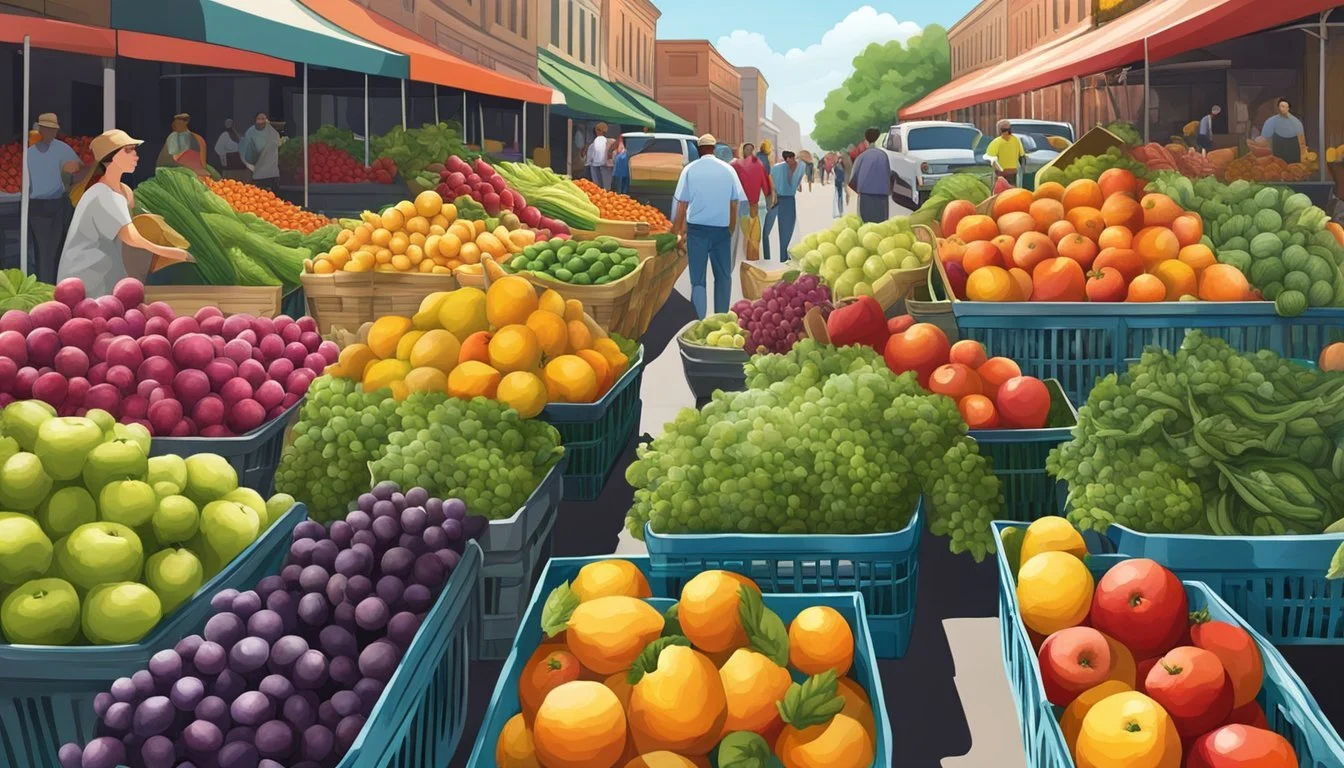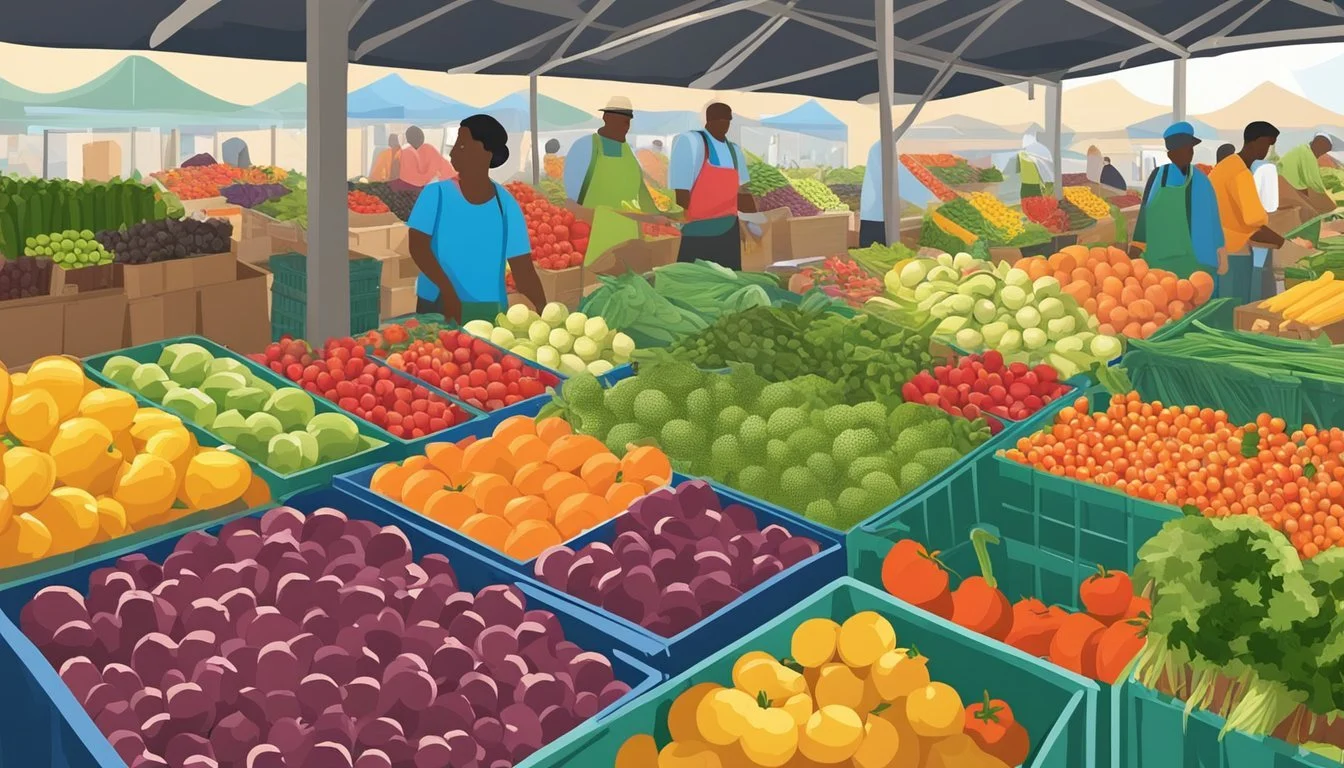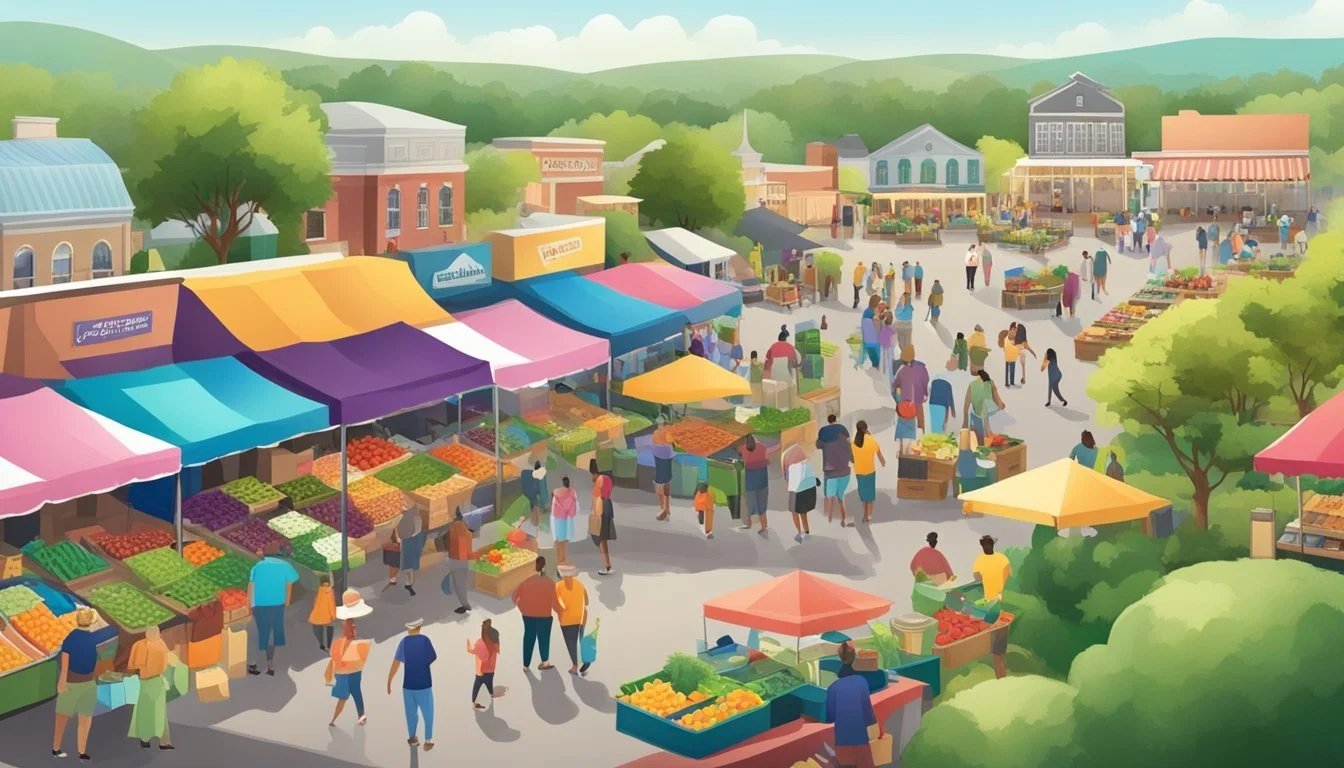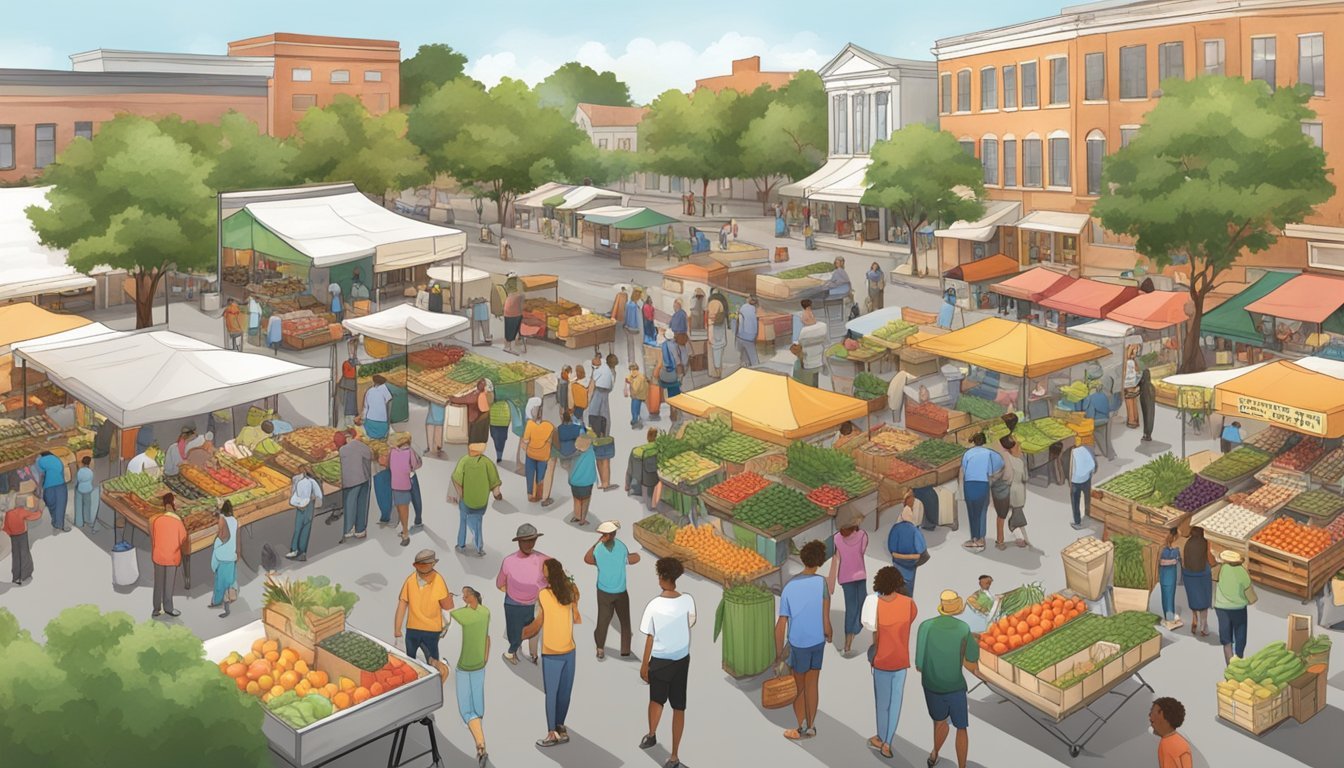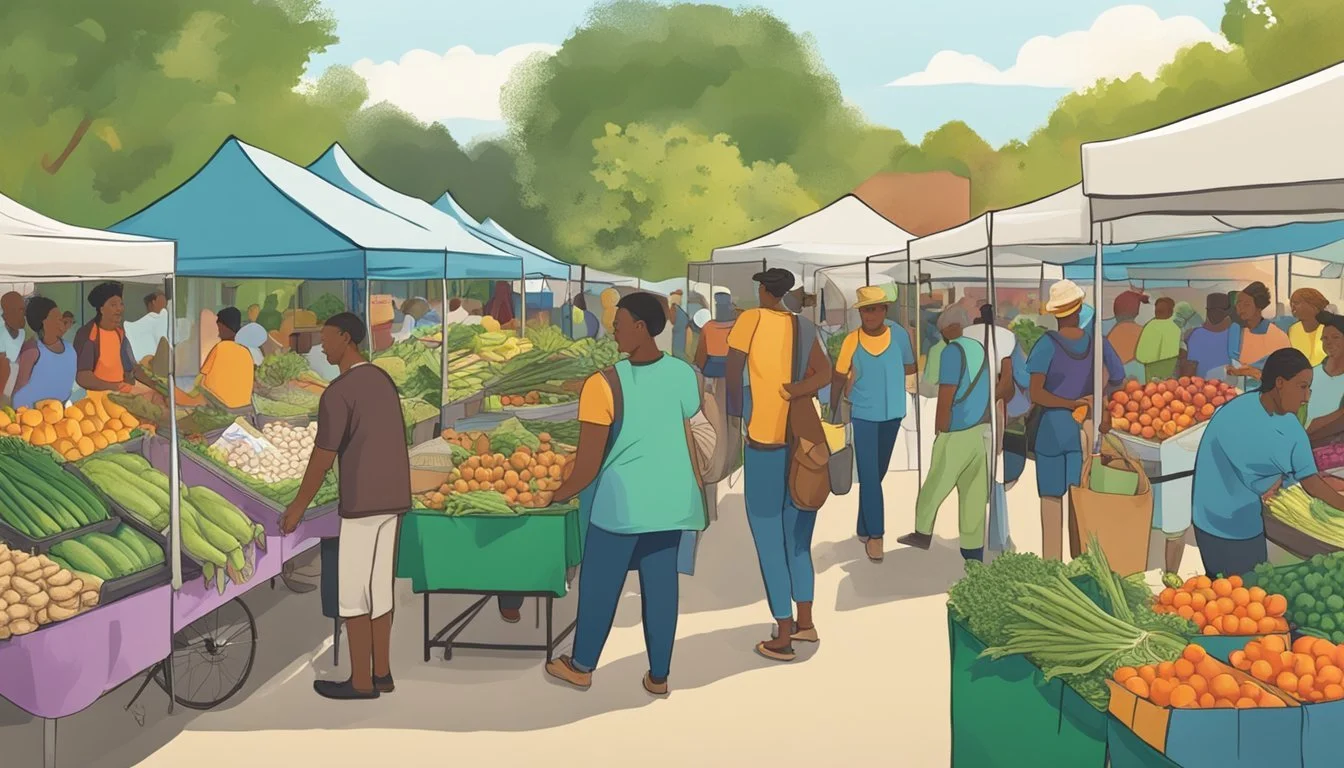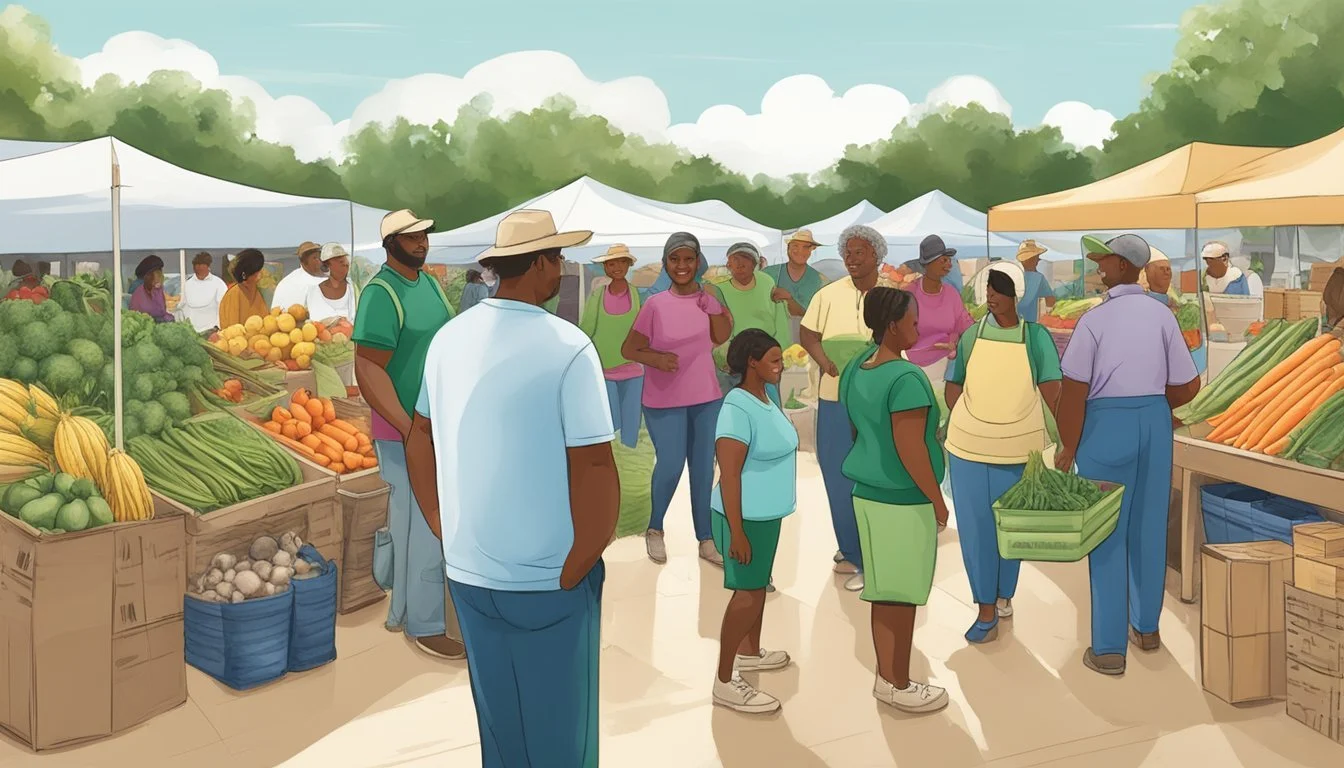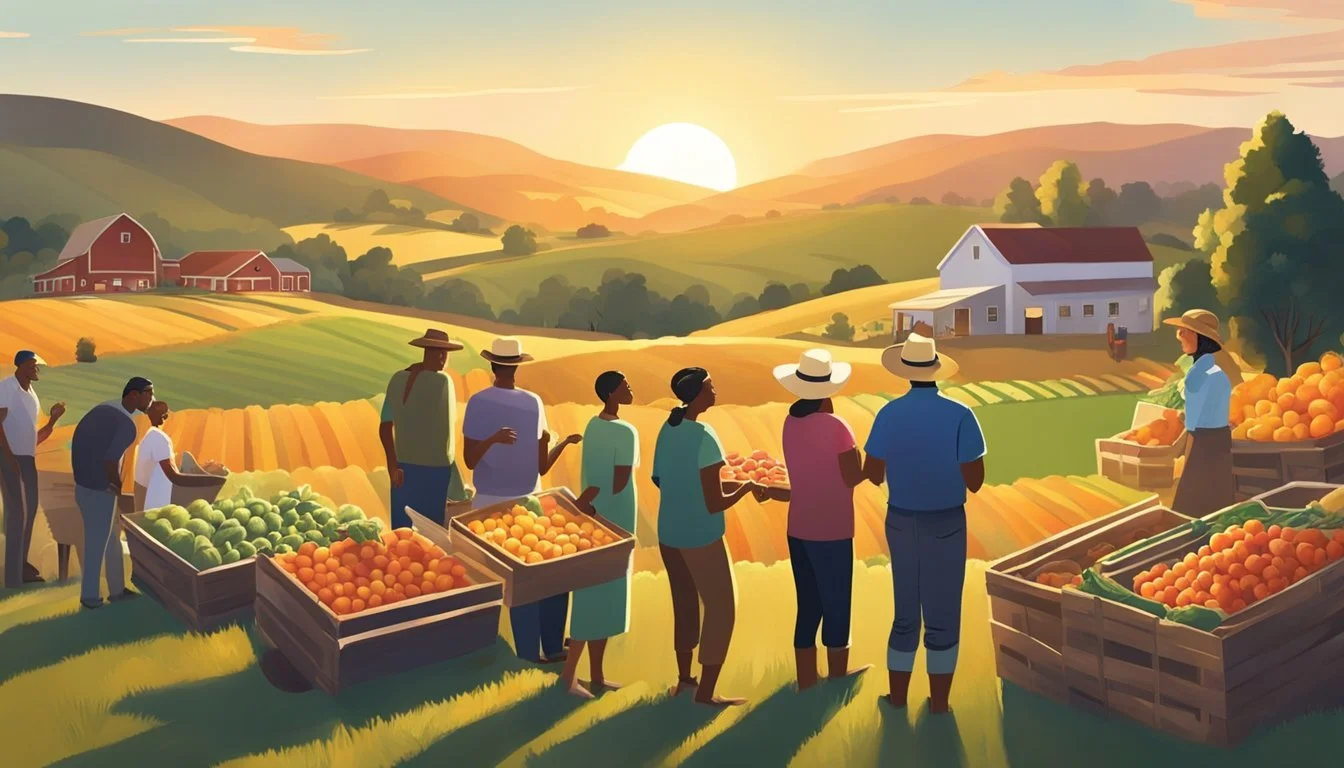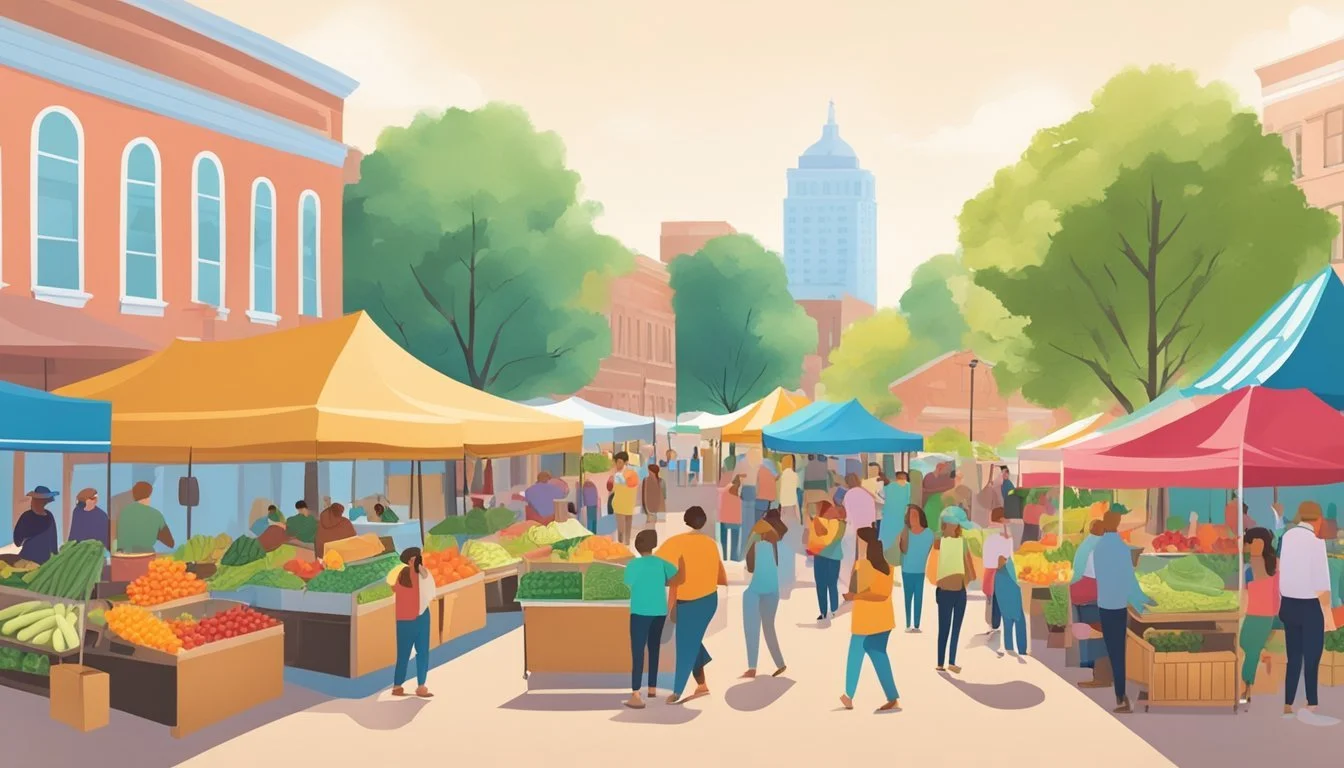Community Supported Agriculture (CSA) in Mobile, AL
A Guide to Local Food Partnerships
Community Supported Agriculture (CSA) represents a growing movement within the city of Mobile, Alabama, aimed at strengthening the local food system and economy. CSA programs enable residents to have direct access to high-quality, fresh produce grown by local farmers. By purchasing shares of a farm's harvest in advance, members of CSAs in the Mobile area receive a regular supply of seasonal produce throughout the farming season, fostering a connection between consumers and the land where their food is cultivated.
In Mobile, CSA offerings can vary, but the core concept remains constant: consumers invest in a local farm and, in return, receive a portion of the harvest. This model provides farmers with upfront capital to support their operations, mitigating some of the risks inherent in farming. It's a mutually beneficial partnership, where farmers gain a dedicated market for their goods, and members enjoy the benefits of fresh, locally-sourced fruits and vegetables.Engagement in CSA programs in Mobile is an investment in community well-being and nutrition, driven by a shared commitment to sustainable agricultural practices and economic support for local growers.
Understanding CSA
Community Supported Agriculture (CSA) is a farming model that fosters a partnership between farmers and the community. At its core, CSA members, often referred to as shareholders, purchase a share of the farm's harvest before the season begins. This model provides farmers with much-needed upfront capital and allows consumers to enjoy fresh, locally-sourced produce throughout the farming season.
Here is how the CSA model works:
Membership: Individuals or families purchase a CSA membership or share from a specific farm.
Season: The CSA season typically aligns with the farm's growing season, where members receive weekly or bi-weekly shares of the farm's harvest.
Produce: Shares often include a variety of vegetables and fruits. Availability is seasonal, and selections may vary as they are based on what the farm harvests.
Farming Practices: Many CSAs pride themselves on organic and sustainable farming practices, though this can differ from farm to farm.
Within the CSA framework, the relationship between consumers and farmers is paramount. Members gain insight into the production of their food and contribute directly to the local economy. Farmers, on the other hand, can plan their crop rotations and harvest according to the secured demand, reducing waste and increasing efficiency.
CSAs in Mobile, AL, offer an array of vegetables and fruits through their shared programs, bringing farm-fresh produce to the community. They underscore a deep commitment to sustainable and organic farming. Each CSA is unique in its offerings and pickup schedules, providing varying levels of commitment to suit the consumer's needs.
Benefits of CSA
Community Supported Agriculture offers multifaceted benefits, enhancing the wellbeing of consumers and providing robust support to local farmers. It focuses on fresh produce and fosters strong community relationships.
For Consumers
CSA members enjoy a range of health and nutrition benefits through consistent access to fresh, often organically grown, vegetables and other farm products. The flavor of CSA offerings is typically superior to that of store-bought produce due to its freshness. Consumers also form a direct link with the source of their food, reinforcing the value of local food.
Health Benefits:
Access to nutritionally rich, fresh produce
Often lower exposure to pesticides with organic options
Community and Financial Benefits:
Supporting local farmers translates to financial support for the local economy.
CSA fosters community relationships as consumers connect with those who grow their food.
For Farmers
Farmers participating in CSA programs receive direct financial support from their community members, which helps in covering upfront costs of farming. This model stabilizes farmer income and reduces the risks associated with food production.
Economic Stability:
Early season capital helps in planning and resource management.
Reduces the burden of marketing and selling produce at various outlets.
Community Engagement:
Strengthens community relationships as farmers interact directly with consumers.
Provides an opportunity to educate community members about the benefits of organic vegetables and sustainable farming practices.
CSA Membership Options
Community Supported Agriculture (CSA) in Mobile, AL, provides residents with several membership options to choose their level of investment and commitment. Share sizes and prices vary, offering flexibility and catering to different household needs and budgets.
Full Shares
Full shares are ideal for larger families or those with a high consumption of fresh produce. Members who opt for full shares invest in the season's worth and receive a full box of seasonal produce each week. This option serves as a significant contribution to the farm’s operating costs and secures a consistent supply of fresh vegetables and other farm products for the member.
Half and Quarter Shares
For smaller households or those new to the CSA model, half shares and quarter shares provide a less extensive, more manageable amount of produce. The investment is lower, and the member still enjoys a regular delivery of fresh produce. Half shares often involve a bi-weekly pickup instead of weekly, while quarter shares are sized to accommodate individuals or those looking to supplement their produce intake. Each share size maintains the spirit of CSA, fostering community investment in local agriculture and ensuring members a share of the harvest throughout the growing season.
The Produce and Products Offered
Community Supported Agriculture (CSA) in Mobile, AL offers residents a wealth of fresh, locally-sourced products throughout the year. These offerings include a diverse range of seasonal produce, organic meats and dairy, and a variety of additional farm products.
Seasonal Produce
Vegetables and fruits constitute a significant portion of CSA offerings, with the availability changing to reflect the region's growing seasons. Members can expect a colorful assortment of:
Spring: tender greens, sweet strawberries, and crisp radishes
Summer: juicy tomatoes, vibrant bell peppers, and succulent peaches
Fall: hearty squash, flavorful apples, and robust root vegetables
Winter: nutritious kale, earthy potatoes, and bright citrus fruits
Herbs and flowers are often included, adding freshness and variety to members' selections.
Organic Meat and Dairy Products
CSA farms in Mobile pride themselves on providing organic meat and dairy products that meet high standards of quality and sustainability. Consumers can often find:
Meat: Grass-fed beef, pastured poultry, and heritage pork
Dairy: Fresh milk, rich cheese, and farm-fresh eggs
These organic options offer a healthier choice and support ethical farming practices.
Additional Farm Products
Beyond traditional produce and proteins, CSA memberships often include a range of other farm-fresh products such as:
Honey: Locally harvested, it's a natural sweetener rich in regional flavors.
Baked Goods: Freshly made bread, pies, and other treats often find their way into CSA shares.
Additional farm offerings could include homemade jams, handcrafted soaps, and other artisanal items crafted with care by local producers.
The Farming Practices
Community Supported Agriculture (CSA) in Mobile, Alabama, embraces a deep commitment to environmentally sound and healthy farming practices, ensuring that the produce shared with the community is nurtured with the utmost care and consideration for sustainability and biodiversity.
Organic and Sustainable Methods
Farmers in Mobile's CSA programs often prioritize organic farming, which excludes the use of synthetic pesticides and fertilizers. Instead, they incorporate practices such as crop rotation, green manures, and composting to maintain soil health and fertility. The use of certified naturally grown seeds is common as they seek to guarantee that their produce is free from genetically modified organisms (GMOs) and to uphold agricultural methods that support the ecosystem's balance.
In their approach to sustainable farming, CSA farmers in Mobile are meticulous in their water conservation strategies and energy use. They may employ technologies like drip irrigation to minimize waste and solar panels to reduce the carbon footprint of farm operations. Many farms aim to be certified naturally grown, which is a peer-review certification program tailored for small-scale, direct-market farmers using natural methods.
Crop Diversity
The very essence of CSA programs lies in their offering of a diverse array of produce. Farmers are committed to crop diversity, which is evident from the varying selection of vegetables and fruits provided to CSA members throughout the year. They curate their crop selection based on climate adaptability, resistance to local pests and diseases, and the community's palate.
The emphasis on diversity not only ensures a colorful and varied diet for members but also fortifies the farm against potential crop failures and market fluctuations. This agricultural resilience is reinforced by maintaining a seed bank of heirloom and region-specific varieties, which contributes to preserving genetic diversity and the area's agricultural heritage.
Community Engagement and Education
Community Supported Agriculture (CSA) programs in Mobile, AL, work diligently toward community engagement and education through various initiatives. They strive to create connections between consumers and their local food producers, fostering a well-informed community.
Events and Visits
CSAs in Mobile frequently organize events and farm visits to encourage direct interaction between farmers and community members. Shipshape Urban Farms, for instance, provides opportunities for the community to visit their urban farm locations. These events serve as a platform for education about sustainable farming practices and the benefits of consuming locally-grown produce. During the visits, attendees might find:
Guided farm tours: A walk through the growing areas with explanations of the techniques used.
Seasonal harvest events: Where community members can participate in picking their own produce.
Workshops: Covering topics like organic gardening, composting, and cooking with seasonal ingredients.
These interactive experiences are crucial in establishing a transparent relationship between consumers and their food sources.
Newsletters and Communication
To maintain ongoing communication, CSAs utilize newsletters—both digital and print—to keep their members updated. These newsletters often include:
Updates on produce availability: Notifying members of what to expect in their weekly shares.
Farming insights: Sharing information on current farm conditions and upcoming products.
Recipe suggestions: Offering culinary inspiration for the seasonal produce provided.
Educational content: Delivery of farming tips and the importance of local food systems.
By consistently engaging with their members, CSAs ensure that the community remains well-informed about the farming process, available produce, and ways to incorporate seasonal items into their meals. These efforts enhance the overall CSA experience and reinforce their commitment to creating an agriculture-supported community.
Local Impact of CSA
Community Supported Agriculture (CSA) in Mobile, Alabama has seen a significant influence on its local community. CSAs involve residents subscribing to receive fresh produce from local farmers, typically on a weekly basis, fostering a direct connection between consumers and those who grow their food.
Local farmers benefit from the CSA model as it ensures a steady market and a degree of economic security. Farming on a small-scale becomes more viable with upfront payments from consumers, which helps cover initial costs for the growing season. This model also empowers farmers to focus more on ecological farming practices without the constant pressure of immediate market demands.
The community's economy gains as dollars circulate within the area. By investing in CSA shares, residents ensure that their money directly supports the local food system and economy. This has a compound effect, as successful local farms often use other local services and products, thus keeping more money within the community.
For consumers, the appeal of CSAs extends beyond the economic; they gain access to fresh, seasonal food grown within their locality. This engagement with local food systems also tends to enhance community bonds, as shareholders often feel a closer connection to the land and the people who farm it.
In terms of marketing, the CSA structure provides a dependable outlet for producers, minimizing the need for costly and expansive advertising efforts. Instead, marketing can be more targeted and personal, often relying on word-of-mouth and community networks, which are deeply embedded within the CSA ethos.
Benefits to Local Community Description Economic Support Direct financial support for farmers and local businesses. Local Food Access Consistent supply of fresh, seasonal produce. Environmental Sustainability Encouraged use of ecological farming methods. Community Engagement Strengthened ties between consumers and food producers.
The impact of CSAs in Mobile reverberates through improved local economic health, stronger community engagements, and a sustained local food culture.
Financial Aspects of CSAs
Community Supported Agriculture (CSA) programs offer a subscription-based model that provides financial support to local farms, creating a direct consumer-producer relationship. This economic interaction stabilizes farm income and allows consumers to invest in local agriculture.
Pricing and Payment Plans
CSAs function on a membership basis where individuals purchase a share of the season's harvest upfront. The price of a CSA share is determined by the farming business and can vary based on produce variety, share size, and length of the subscription. Members might encounter different payment plans, including:
Full payment upfront: A single payment before the season begins, securing a weekly supply of fresh produce.
Installment plans: Divided payments across several months, offering flexibility to the consumer.
In Mobile, AL, local CSA members can expect a financial structure that supports the operational costs of the farm while fostering a sustainable consumer relationship.
Supporting Local Agriculture
The financial contribution of CSA members is directly channeled into the local economy and has shown to significantly boost a farm's income. Take for example the World PEAS Food Hub, which by employing a CSA model, saw an increase in local farmer income from $39,397 in 2008 to $157,322 in 2014.
Financial support through CSA memberships:
Encourages financial sustainability for farms.
Contributes to greater economic resilience within the community.
Establishes a reliable market for farmers to sell their products.
In supporting a CSA, consumers essentially become stakeholders in the agricultural business, connecting financial support to the wellbeing of local food systems.
Challenges and Considerations
Community Supported Agriculture in Mobile, AL, confronts specific challenges that affect both the sustainability and success of CSA models. These range from unpredictable weather patterns to the complexities of distributing produce to members.
Weather and Crop Yields
Mobile's growing season is subject to weather conditions that can significantly impact crop yields. A CSA farm must plan for seasonal variability, which can include:
Extended Heat: High temperatures during the summer can stress crops, potentially reducing yields.
Unexpected Frosts: While rare, an unanticipated frost can damage or kill crops, particularly outside the typical frost season.
Farmers often address these risks through diverse crop selections and the implementation of weather-resilient farming practices. Income stability for farmers can be challenging when dealing with weather uncertainties, and planning requires a meticulous understanding of local climate patterns.
Logistics of Distribution
Efficient distribution is key to the viability of a CSA in Mobile, where transportation plays a crucial role. Several logistical considerations include:
Distribution Points: Identifying convenient delivery locations or pick-up points within metropolitan areas and Mobile directly affects shareholder satisfaction.
Transportation Costs: Fuel costs and vehicle maintenance for distribution affect the overall income and pricing structure of the CSA share.
Share Size Planning: Aligning harvest size and frequency with shareholder demand ensures minimal waste and consistent distribution.
Effective planning and the use of technology can streamline distribution efforts, thereby maintaining the freshness of produce and ensuring the on-time delivery of shares to CSA members.
CSAs Beyond Mobile, AL
While Mobile, AL, has a strong CSA presence, the concept extends widely, playing a pivotal role in the broader Gulf region and reflecting the growing farm-to-table movement within the United States.
CSA in the Wider Gulf Region
Community Supported Agriculture is not just flourishing in Alabama. Neighboring states like Mississippi (MS) and Florida (FL) also participate actively in CSA initiatives. These programs connect consumers directly with local farms, offering them a share of the harvest throughout the seasons. For example:
Mississippi has a burgeoning CSA scene with farms like Delta Blues Farm offering year-round produce.
In Florida, the warm climate allows for an extended growing season, with farms such as Sweetwater Organic Community Farm providing a variety of seasonal selections to CSA members.
CSAs in the Gulf region support not only seasonal eating habits but also bolster the local economies by keeping the agricultural benefits within the community.
National CSA Trends
Across the United States, the structure and offerings of CSA programs have evolved. Now, they consistently incorporate:
Flexibility: Many CSAs now provide various sized shares to suit different household needs.
Diversity: Offerings often include a wider range of produce, as well as add-ons such as eggs, meat, baked goods, or preserved foods.
CSAs have increasingly adopted online platforms for orders and payments, reflecting digital transformation trends, and a number have partnered with food hubs to expand their reach and impact in their communities. This trend reflects a pivotal shift in consumer preference towards organic and locally sourced food, which has been instrumental in the spread of CSA programs throughout the United States.
Concluding Thoughts
In Mobile, Alabama, Community Supported Agriculture (CSA) lends itself as a powerful medium for fostering community relations and fortifying sustainable farming practices. CSA members directly support local farmers, underpinning a system where organic farming is not just viable but thrives. Through their membership, individuals contribute to the environmental stewardship and gain access to nutritious, health-promoting produce.
Sustainable Farming
Encourages biodiverse, eco-friendly techniques.
Reduces the ecological footprint.
Health Benefits
Fresh, organic produce with a higher nutritional value.
Potential for reduced exposure to pesticides.
CSAs in Mobile illuminate the symbiotic relationship between farmers and consumers. This model exemplifies a commitment to health and wellbeing, extending beyond just the physical produce to the vitality of the local economy and environment.
Through investing in CSAs, consumers not only indulge in the richness of nature's bounty but also contribute to a resilient food economy. It’s a model premised on trust and shared risk, providing a stable income for farmers and assuring consumers a share of the harvest. The promise of CSA, thereby, is twofold: sustaining the earth that nourishes us and fortifying the bonds that keep communities resilient.
The rise of CSAs in Mobile, AL, signals a shift towards more conscious consumption patterns, where the value lies not only in the product but in the process that brings it to the table – a clear testament to the adage that one reaps what they sow.

